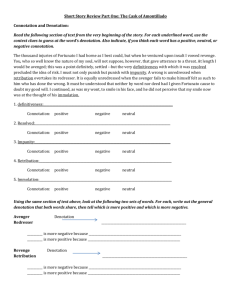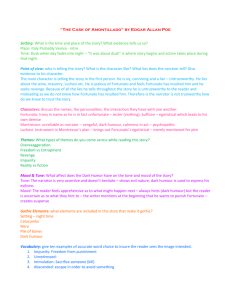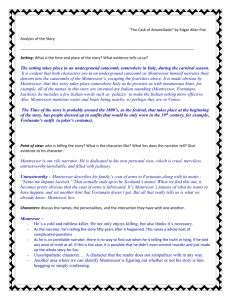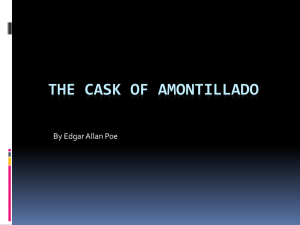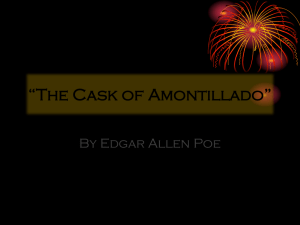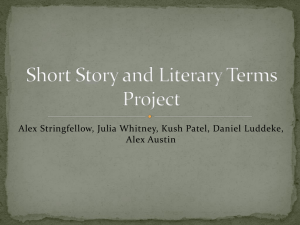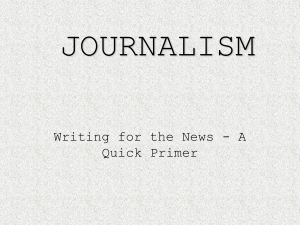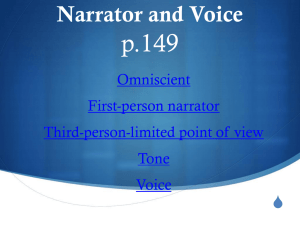essay - Wikispaces
advertisement
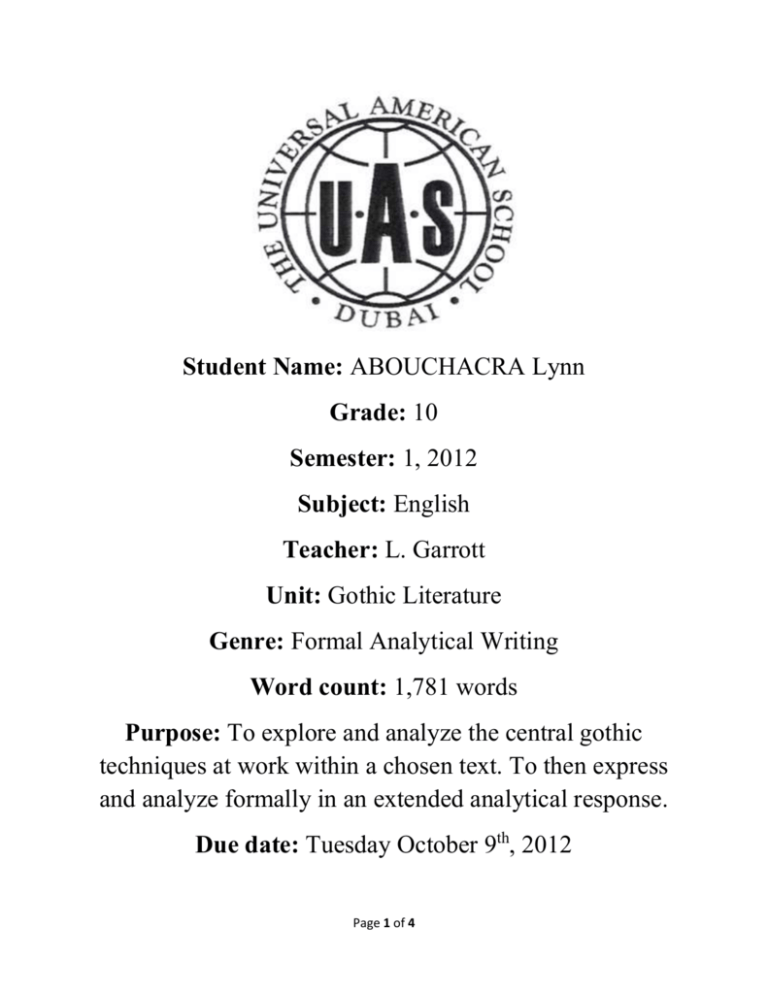
Student Name: ABOUCHACRA Lynn Grade: 10 Semester: 1, 2012 Subject: English Teacher: L. Garrott Unit: Gothic Literature Genre: Formal Analytical Writing Word count: 1,781 words Purpose: To explore and analyze the central gothic techniques at work within a chosen text. To then express and analyze formally in an extended analytical response. Due date: Tuesday October 9th, 2012 Page 1 of 4 Poe never had a positive image of the world, he was known as a tormented alcoholic. He said: “Nature is dark, sinister and mysterious and that man is flawed”. The full name of the author is Edgard Allen Poe; he wrote a gothic novel called The Cask of Amontillado. One can find many literary features in the text, like: psychology through characterization and inclusion of fear and horror. They are part of the gothic literary features which are essential in a gothic text/novel/poem/etc. Without them one couldn’t find anything gothic, mysterious, and scary; they bring the effect to the reader. This essay will expand on the following: Poe successfully used two gothic elements: psychology through characterization and inclusion of fear and horror, to show that foolishness and folly are two of man’s flaws. And the reason as to why he wanted to do so is because of the miserable life he had due to the failure of humans and the darkness of nature. Psychology through characterization is a prominent Gothic literary feature which is essential in a gothic text/novel/poem/ etc. Without the Gothic literary features, the reader won’t find anything gothic, mysterious, scary, because they bring the effect. The reader wants stories greater than normal that is done through psychological details included for the central characters, the author focuses on uncertainties and contradictions of the human psyche through psychological investigation. In the text “The Cask of Amontillado” one can explore the personalities of Fortunato and Montressor because of the psychology through characterization in the text that the author points out, like: “Proceed”, I said; “herein is the Amontillado. As for Luchresi-“ “he is an ignoramus”. This characterization through dialogue shows the reader how Fortunato values his pride, and produces a link to the theme of foolishness and folly, one of man’s flaws. Montressor even planned what he had to say to make Fortunato want to go even more. He knows that Fortunato values his pride immensely, so he was smart enough to use that against him by mentioning Luchresi, his rival. Fortunato tell into the trap that is proved by the fact that he changed his tone when Montressor mentioned the name. Fortunato wants to be the one who knows everything about wine. One can assume that Fortunato wants to be respected and even feared, he wants to be proud of himself which brings one back to the idea of foolishness and that Montressor is tricky and he wants to kill his friend, it enforces the theme of folly. And the next quote shows that the author is describing how stubborn and determined Fortunado is: “My friend, no. It is not the engagement, but the severe cold with which I perceive you are afflicted. The vaults are insufferably damp. They are encrusted with nitre.” “Let us go nevertheless. The cold is merely nothing” Fortunato wants to see the pipe Montressor received, he wants to know everything about wine and he is very curious especially because of Montressor. It’s the reason why he didn’t want to go back when he was coughing, he was determined to go and check it out. He is foolish because he was already drunk and he was determined to go and see the wine, it made his decision ridiculous. Before insisting, Montressor said that it would be better if they went back, but it was actually part of what he was supposed to tell Fortunato to trick him and want him go even more, he made him more curious, so one can shoulder that he is sly. The reader is seeing everything through the lens of Montressor; what he is planning, why he is acting like that, what he is thinking, what he is feeling; the point of view of the text is the first person, so the narrator, which is Montressor, is a character within the story as the “I” voice. Montressor is a Villain because he is going to kill his friend since he embarrassed Page 2 of 4 him, and the punishment he applied is too severe. The reader can find dramatic irony because he knows something Fortunato doesn’t, which is that his death is near. Finally, the last quote about psychology through characterization is the following: “He! he! he! - he! he! he!” “But is it not getting late? Will not they be awaiting us at the palazzo?” Fortunato can be a joker, he doesn’t take life seriously, and he has a joker attitude; it makes revenge so much easier for Montressor as Fortunato is naïve and doesn’t pay attention to every detail going on around him. In this part of the text, Montressor has already succeeded in his plan, he achieved everything he wanted to do and say to Fortunato. Fortunato wasn’t worried even when Montressor was left with one tier to be fitted and plastered in, he thought that is was a joke and that everything was going to be back to normal, that they were going to go back to the palazzo and drink some wine. The reader can conclude that there is a side of him that likes making fun of people and joking around; that doesn’t care about the world which shows that Fortunato is foolish. The reason to why Montressor wants to kill his friend is because Fortunato made fun of him and embarrassed him, the punishment was too severe, it makes the theme relate even more to folly; Montressor can’t handle a joke, he gets offended very easily. The inclusion of fear and horror is part of the Gothic literary features too; it can help the reader feel fear, terror and horror through the descriptions of the author, the setting, the mood, the atmosphere, the characters, and the tone. One can find many parts in the text that makes the reader more interested, more curious about what’s happening and what is going to happen to the character that is in trouble, like: “Two flambeaux”, “the foulness of the air cause our flambeaux rather to glow than flame”, the foulness of the air isn’t a good sign for the reader, it enforces the idea that something bas is going to happen; therefore the reader is foreshadowing that something bad is going to happen to Fortunato. It is the foulness of the air that is making the atmosphere of the text be sinister; since it is happening in a scary and dark location, so the reader knows that the story won’t end well, it brings fear, suspense, horror and terror. The flambeaux are glowing instead of flaming because of the foulness of the air; one can see that the diction is formal; since it is characterized by a learned vocabulary and grammatically correct forms. It puts in force the concept of foolishness and folly, because of the fact that the foolishness of the air is foreshadowing that something bad is going to occur. The next quotes evolve around death and how foolish Fortunado was: “The damp ground if the catacombs of the Montresors”, “long walls of piled skeletons, with casks and puncheons intermingling, into the inmost recesses of the catacomb”, “the drop of moisture trickle among the bones”, “Its walls had been lined with human remains, piled to the vault overhead, in the fashion of the great catacombs of Paris”, these quotes are all scary since they all evolve around death, the reader should be sure that someone is going to die which brings one back to the concept of foreshadowing, it makes him want to read even more and know what will happen, if Fortunato is really going to die or not. The idea of foolishness and folly is always present in the text as Fortunato was too foolish to realize the circumstance of the situation. The final quote shows how Montressor contradicted himself, he wanted to kill Fortunado and in the end he regretted it:“A low moaning cry from the depth of the recess”, “there was a long obstinate silence”, “and then I heard the furious vibration of the chain”, “a succession of loud and shrill screams”, “for a brief moment I hesitated, I trembled”, “I replied to the yells of him who clamoured”, “but now there came from the niche a low laugh that erected the hairs upon my head”, “it was succeeded by a sad voice which I had difficulty in recognizing as that of the noble Fortunado”, “My heart grew sick; it was the dampness of the catacombs that made it so”.Montressor is scared, he killed his friend, he is a murder, a criminal, he is in a crypt, there are human remains Page 3 of 4 everywhere and the dead body of Fortunato, one knows that Montressor is scared, it makes the reader imagine like he was in his place, and that scares the reader, no one would want to be in his place, which brings one back to the idea of foolishness because he did all of this, achieved his plan and regretted it in the end. The idea of imagery is present in the text, since one can find a language that evokes a physical sensation produced by one of the five senses. Imagery creates pictures in the reader’s mind, and also suggests a number of imaginative associations. One can conclude that Edgar Allen Poe used betrayal in this text because we was betrayed by his two fathers when he was just a young boy, so his childhood affected his novels, his poems, his stories, etc., it made him want to show that foolishness and folly are two of man’s flaws, they only think about what is good for them; in this case it is Montressor’s pride. Poe’s biological father rejected him when he was a baby, he left his wife, and made her a single mother, she was working really hard to let her children survive, one of them was Poe, but sadly, she died of tuberculosis. Poe was adopted by the Allens but Mr. Allen was never trying to help him, it was always Mrs. Allen who loved him like he was her own child, but she died of tuberculosis, so he was alone with Mr. Allen, and he rejected him too. He was heartbroken, and that really affected him, he used the gothic style when he wrote since it talked about sadness, anger, revenge, betrayal, horror, terror, it was scary, he wanted to show how flawed humans are. Page 4 of 4
